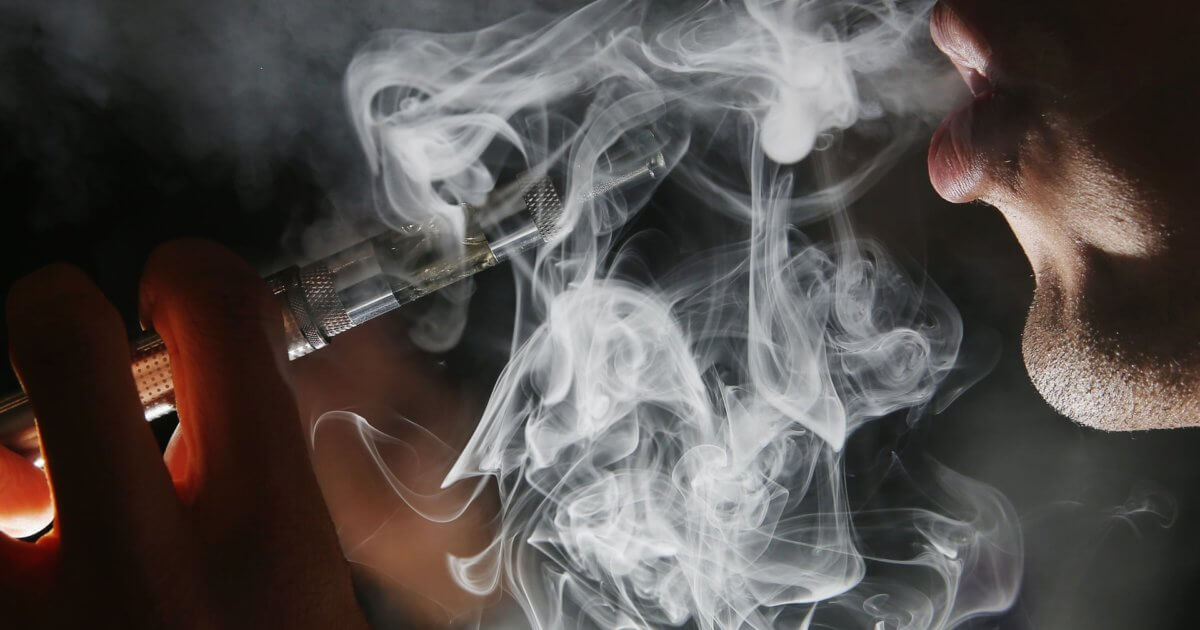The government says that they’ve found a chemical in marijuana vaping oils that may be related to the mysterious lung disease that users have been reporting.
Three deaths have now been linked to vaping pens and between three and four hundred people in 29 states have experiences a mysterious lung illness, which doctors have linked to their use of vape pens. Vape pens delivering both THC, a marijuana component, and nicotine, have been suspected as causes for the illness.
Read MoreRELATED: "Secret Shoppers" JUUL Tries To Clear its Name By Sending Fake Shoppers To Spy On Sellers
This is the first common element across vaping samples to be detected, but it has not yet been proven to be the cause of the illness.
Vitamin E can be found in canola oil, olive oil, and almonds, and the oil derived from the vitamin can be found as a vitamin supplement over the counter, as is has not been know to cause any harm when ingested. It can also be found in some skin treatments, and has not been known to cause negative side effects when applied topically. Still, it may cause harm when it is inhaled — it’s oil-like properties may cause some of the symptoms that patients have reported including cough, shortness of breath and chest pain.
Vaping ban in michigan
This comes as Michigan becomes the first state to ban flavored e-cigarettes. The decision came from governor Gretchen Whitmer, after her chief medical executive said that vaping among young people “constitutes a public health emergency.”
More than 3.6 million kids reported using e-cigarettes in 2018, according to the FDA, or about a fifth of all high school students. San Francisco, where JUUL — the leading e-cigarette company in the country — is based, was the first city to ban e-cigarettes in June.
"As governor, my number one priority is keeping our kids safe," Michigan Gov. Gretchen Whitmer said in a statement. "And right now, companies selling vaping products are using candy flavors to hook children on nicotine and misleading claims to promote the belief that these products are safe. That ends today."

A new study on e-cigarettes
In a new study, researchers at Baylor College of Medicine say chronic exposure to e-cigarette vapors can cause lung problems and can hurt the immune system.
The study involved four groups of mice. The first group was exposed to e-cigarette vapors with nicotine, in the same mixture of solvents they come with in e-cigarettes. The second group received the vapors but with not nicotine and no solvents. Two control groups were exposed to tobacco smoke and clean air respectively.
The mice were exposed for four months, which is about the equivalent of a person smoking from their teenaged years until their fifties.
Researchers found that the mice who were exposed to tobacco smoke or e-cigarette vapors were more likely to have severe lung damage and excessive inflammation – similar to people who get emphysema from smoking cigarettes.
They also found, unexpectedly, that the e-cigarette vapor without nicotine also damaged the lungs. They didn’t find emphysema or inflammation in these mice, but they did find abnormal fat buildup that created problems for normal lung function.
Discussion about e-cigarette safety
The discussion about how to handle the increase in E-cigarette sales to kids intensified when the Food And Drug Administration issued a proposal saying that companies would have to submit E-cigarette products for review by August 8, 2021, instead of by 2022. The FDA also says the government will be able to step in at any time to:
(1) Limit online vendors from selling without without a "heightened age verification process."
(2) Limit sales in brick-and-mortar vendors without age restrictions.
(3) Limit sale of products specifically aimed at young people.

The proposal was designed to address a big increase in kids smoking E-cigarettes. "The most recent data show more than 3.6 million middle and high school students across the country were current (past 30 day) E-cigarette users in 2018," Scott Gottlieb, commissioner of the FDA, said in a statement at the time. "This is a dramatic increase of 1.5 million children since the previous year. The data also showed that youth who used E-cigarettes also were using them more frequently and they were using flavored E-cigarette products more often than in 2017. This is particularly troubling given that research shows that kids using E-cigarettes are more likely to take up combustible cigarettes."
There was also some pressure for the company to stop selling fruity flavors, which are enticing to kids. But because JUUL products actually do help some people quit smoking, there was a debate over whether banning fruity flavors altogether was the best option.
JUUL’s recent campaign
In a recent campaign, JUUL has printed ads that emphasize their sharp attention their products’ distribution. The primary text in the ad reads, “Cracking Down On Underage Sales At Retail Stores.” Underneath, it asserts the company’s opposition to teenage use of the product, saying that “youth vaping is a serious problem,” and then describes a new tactic to clear the company name of any malpractice: “One step we are taking to combat it: Conducting about 2,000 secret shopper visits per month at retail stores nationwide. We also penalize retailers that fail FDA compliance.
A SurvivorNet writer went on her own little journey to a deli in lower Manhattan to see whether they would need identification to buy a JUUL. Not only did the cashier card her, he also said that he cards everyone no matter what. He didn’t think he’d encountered any “hidden shoppers.” He also said that the fruity JUUL flavors, which the FDA has deemed a hazard because they attract younger kids who otherwise would not have been addicted to nicotine, haven’t yet been completely taken off the market in New York City, but they will be soon.
The warning labels on the packaging are definitely clear. This writer bought a “fruit” flavored package of JUUL pods, along with the regular “tobacco” flavored pack that comes with the actual JUUL stick. The packaging of the stick itself has a large label that reads “WARNING: this product contains nicotine. Nicotine is an addictive chemical,” while the package of pods has a label with a skull and cross bones image, reading “DANGER,” and underneath that in smaller letters, “POISON.”
Information about vaping and cancer
The general consensus about vaping is that it’s a safer alternative to smoking cigarettes … but can we know that for sure? The biggest issue with vaping and Juul is that doctors aren’t really sure what the long-term effects will be. Dr. Brendon Stiles, a thoracic surgeon at Weill Cornell Medical Center, said that studies on these effects need to be done now — especially since so many young people are taking up vaping.
Dr. Brendan Stiles, thoracic surgeon at Weill Cornell Medical Center, on vaping and cancer
“If we wait 10 to 15 years until we see the clinical effects on all these kids who have taken up vaping, it’s going to be too late,” Dr. Stiles said. “What effect do these compounds have on lung health? On lung inflammation on young people? On old people? On previous smokers?”
Dr. Stiles pointed out that there was just a landmark study that showed the death rate from cancer has fallen to the lowest point in 25 years — and there are people who are worried that vaping may cause that number to go back up. “There’s plenty of history of other inflammatory lung conditions causing or triggering lung cancer, so for me it’s not a great leap to think that inhalation from vaping can trigger lung cancer down the road or other inflammatory lung diseases,” Dr. Stiles said.
Learn more about SurvivorNet's rigorous medical review process.


